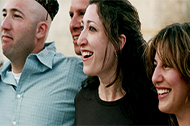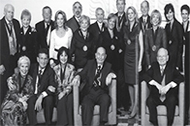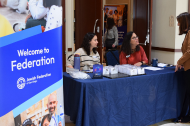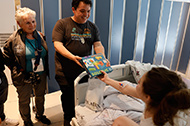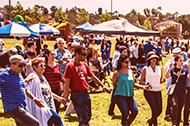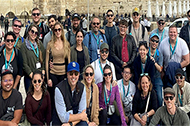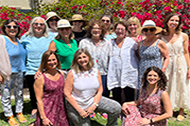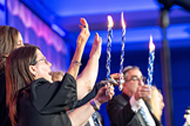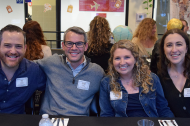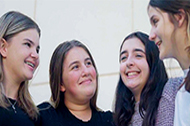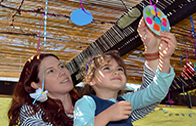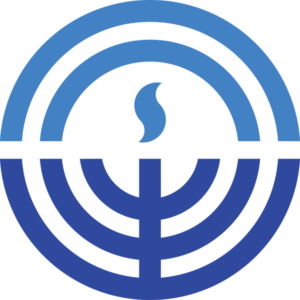Reflections from Day 4 – Alan Viterbi
12/02/2023
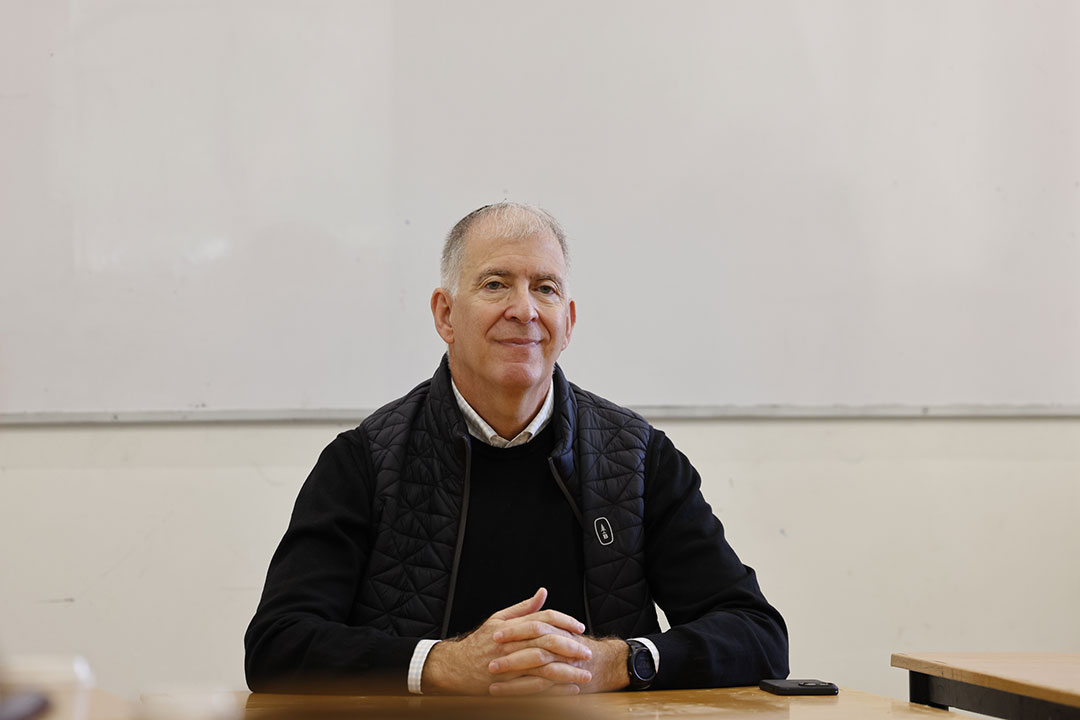
Written by Alan Viterbi on November 30, 2023
Thank you for having joined me on this journey. This is the final installment of my travel notes, covering our last day in Israel. While I will be processing what we saw and heard for many weeks and months to come, I have included some initial reflections on the experience. Sorry for the length, but the last day was filled with important discussions and new experiences, and I wanted to share the feelings I have leaving Israel in this moment.
Day 5 Travel Notes
 Donniel Hartman, Hartman Institute
Donniel Hartman, Hartman Institute
- Donniel Hartman is a liberal Orthodox rabbi, a highly regarded teacher, and a deep thinker about issues facing Israel and the Jewish people.
- He spoke about where Israeli society was before October 7th and where it is after, and the issues Israel will need to consider after.
- Before the horrors of October 7th, after nine months of protests and national debate about the balance of power between the executive and judiciary, society had changed. A majority of Israelis understood that Zionism was not determined by the borders of the state of Israel but about the values of Israeli society. Most people had always agreed that these were important issues to be addressed in the future; the change was that people believed these were the issues that needed to be addressed now. He said he still believes in these things, but that after 10/7, the people are in a new place in terms of what needs to be focused on. Now, the greatest challenge for Israelis is fear. It is hard to think about your second or third challenge when fear is first.
- He spoke about the tomorrows haunting him today. One tomorrow is the tremendous unity in Israel and its supporters around the world. Every day that passes, takes us further from 10/7; it fades in memory. When the war resumes (our meeting was before the events of last night), there will be enormous pressure to stop the war. The field of operation in southern Gaza is ten times more complicated than what was achieved in the north of Gaza.
- You can already hear the international community focused on demanding peace between Israel and the Palestinians. The world is fearful of global conflict because today the Palestinians are the tip of the spear of Iran. This is why the U.S. sent two aircraft carriers to the region. The world is worried about the risk of global conflict. This framework will lead to stupid positions on what needs to be done next. Many outside of Israel are calling for handing Gaza over to the Palestinian Authority (PA). This is one of the silliest ideas because the PA don’t even control Ramallah, let alone the West Bank. Another idea being floated by other countries is for a renewed PA, which is shorthand for a new dictator to take over the PA who, by extension, will be vicious enough to control the Palestinians, and who can be bought off to keep things under control by out terrorizing Hamas. This is neither moral nor something you can place your confidence in to prevent further conflict. As the world presses for a resolution and 10/7 fades, the world will focus on Palestinian casualties and what comes next.
- However, Israelis won’t be worrying about the world’s demands because they need to end the genocidal risk to Jewish lives. He is thinking about how Israelis talk about resolving the Israeli Palestinian conflict with an Israeli society that is in war mode. Especially when Israel is not only facing those wishing to kill Israeli civilians in Gaza. He believes there is a Gaza waiting in Jenin (in the West Bank), not to mention Hezbollah making the same threats across the Lebanese border.
- The world won’t care when Israelis say that they offered the Palestinians 97% of the land in 2003. Israeli society will feel threatened and will therefore move to the right. Israelis will reject as antisemitic the growing voices in the West seeking to prevent them from eradicating a murderous terrorist organization which has killed Israelis and has publicly declared that it intends to do so again.
- Israelis cannot ignore any more calls of death to the Jews. You don’t see any condemnation of the horrors of 10/7 in Palestinian society. Israelis cannot live with evil around them. They cannot ignore it anymore. It matters what Palestinians say in Arabic instead of English. It matters what they teach in their schools. It matters when they pay the families of “martyrs” after they kill Jews. After 10/7, this cannot be ignored anymore. Those changes are going to take a long time.
- He believes that the world is not ready for Israel fighting until Hamas is eradicated. He asked how does one begin to bridge that gap? How to get the world to have a little more patience. It’s not complicated. There is a problem that must be addressed.
- Shortly before we met with him, two terrorists were killed entering Jerusalem, after they murdered three Israelis and injured eight more. The terrorists’ families will now earn 10 times what the average Palestinian makes. How do Israelis talk about that as 10/7 gets further away? It is far easier to call for peace in San Diego, but Israelis are genuinely afraid for their security. Israel may be powerful but its civilians can still be slaughtered. It’s not about facts and figures, its about having empathy for what Israelis are feeling after 10/7.
- And he said that Israel will need to talk about peace again and about human rights. It’s a huge challenge. He recognizes the right will grow after this war, but he is not worried by that. He is worried that their rhetoric will influence the mainstream. He is focused today on how Israelis talk about the conflict now that 10/7 has made them a profoundly changed people. Israel as a liberal Jewish state is an idea that still matters. But Israelis will be building a coalition around security. The politics of fear will shrink Israel’s view as they focus on themselves.
- After the war, there will be a huge political current pushing for unity. A lot of leaders will resign after the war, but not Netanyahu. But when he is gone, there will be a national unity government that will need to rebuild the economy and bring Israeli society back together. They will need to bridge the divides that existed before. National unity governments by definition avoid conflicts. By example, he spoke of the previous Bennett government, which helped run the country but didn’t resolve any of the major issues facing society.
- He is focused on how to continue to educate and have people talk about issues of a liberal Jewish Israel, when the currents will be pushing to focus on security and unity. Israel has a lot of people who died and a lot of mourning, but Israelis need to start thinking about tomorrow.
- He is not worried about Israel’s survival. He is worried about who Israelis will be after what they have experienced, and what they have seen.
- In the interim, he left us with the challenge of when we hear people call for a ceasefire, to understand the fear we felt in Israeli society and to think about what it means to have evil in one’s life.
 Immigrant Absorption
Immigrant Absorption
- Next met with the head of the Jewish Agency (a social service organization which is a joint venture of the Israeli government and Jewish communities around the world) responsible for immigrant absorption, and Diana, a 39 year old mother of two who immigrated in 2022 from the Ukraine following the Russian invasion. Diana is one of 15,000 Ukrainian immigrants since the war started, and more are still coming. Some of these new immigrants, who had to be evacuated from war zones in the Ukraine, have now had to be evacuated again, with many living in the north or south of Israel. The Agency is working to support them with specialized psychological counseling.
- Diana spoke about how she thought a war in the Ukraine was impossible before the Russian invasion. Many of her friends died in the missile attacks in the first days of the war in the Ukraine. Her parents urged her to move to Israel, as her children were 8 and 9 years old then, rather than to another European country. They told her that in Israel she wouldn’t be a refugee, she would be part of something. As she crossed the border, and immediately began receiving assistance from the Agency, she realized she wasn’t in her grandmothers place, who had fled the Nazi invasion with nowhere to turn to. She resettled in Jerusalem. When she left Odessa, she thought her life was over, but now with the assistance she received, she realizes that is not the case.
- The attack of 10/7 was a special trauma for her and her children. In addition to the shock of again being in a war zone, they had to learn new protocols when the missile sirens went off. She was afraid and left for Europe with her children. But there everyone told them to hide any outward symbols of their Jewish identity, because it was dangerous to be identified as Jewish in those societies. She realized it was safer to return home to Israel, even in a time of war. She said she never thought in the 21st century she would be living in two wars.
- Just when you think you have realized all the ways in which Israeli society has been impacted by the terror at the border and from the missiles, you find another unique trauma generated.
 Brothers in Arms
Brothers in Arms
- Brothers in Arms was formed earlier this year in response to the government proposal to shift the separation of powers between the executive and the judiciary. It rapidly became the backbone of the protest movement which brought hundreds of thousands of Israelis into the streets weekly for months and months, and in the summer began calling on reservists who had voluntarily extended their reserve status to begin declining call ups. Brothers in Arms was founded by a highly successful tech executive turned venture capitalist, together with some fellow reservists from his unit.
- The morning of 10/7, within hours of the shock of Hamas’ murderous attack, Brothers in Arms said the protests would be put on hold, all reservists should answer the call to duty, and transformed the organization from a political movement into a purely volunteer organization (Brothers and Sisters for Israel) focused on solving the nation’s problems before the government was capable of responding. Today they are the largest chamal in the country, with over 50,000 active volunteers in 70+ teams, each one focused on solving a specific problem (e.g. home matching for refugees, picking up pets left when evacuees had to scramble and reuniting them with their families, picking crops when many foreign agriculture workers have left the country, working in factories where the employees have been called up, funding for taking hostage families abroad to speak to international organizations, economically supporting families of hostages whose breadwinners are captive in Gaza, raising capital to provide training for kibbutz security teams, etc.).
- The organization operates an umbrella that helps people do what they are good at to help fill the voids. When they see a need, they jump in. They don’t compete with the government, because when the government wants to jump in they stand back. A great example was that they within two days of 10/7, they were using their startup skills to build a tech platform to help identify which of the missing had been kidnapped, tracking the phones of the missing, and viewing security footage and social media posts from Hamas. Once this was fully operational, this project and the technology tools they created were absorbed by the government. They only move on problems with scale, and always prioritize applying a human touch to addressing the need.
- One of the areas they have stepped into has been engaging Israel’s enemies on the web. They have a team which has been foiling Iranian cyber warfare, which dramatically increased its attacks beginning on 10/7, as well as pushing back against Hamas lies and distortions on social media. One small example is that they realized Hamas had let expire the hamas.com domain, paid the fee, and created an authentic Hamas website using their own videos and statements to expose their motives and barbarity (it is well worth looking at). This website has had millions of views. But beware of making a donation on the website, as they incorporated an option for people to donate to the website, and are now beginning to use this to track how Hamas has raised funds from abroad. (But don’t worry, they don’t forward the funds raised from the website to Hamas.)
- In summing up the overview of how a political activist against the government pivoted into the nation’s number one problem solver in civil society, he said, “the attack on 10/7 were as bad and personal as anything for me. We had to do our part.”
 Hostage Square
Hostage Square
- All of us had seen photographs of the sabbath table set out in the large plaza outside the Tel Aviv Museum of Art, but none of us were prepared for what we experienced visiting what is today known as The Hostages and Missing Square.
- It is a spontaneous gathering place for the families of people who are known to have been kidnapped and taken to Gaza, or whose fate is still unknown.
- The plaza is filled with art installations trying to bring understanding to the enormity and barbarity of the hostage-taking. From the Sabbath table with 240 chairs, to the cages with a baby mannequin and a sign asking if you know where your kids are sleeping tonight, to a jumbotron with a digital timer tracking the days, hours and minutes since the hostages were dragged into Gaza. The pictures of the hostages are everywhere, and people wander through the plaza taking in the painful messages conveyed by the art. The hardest part was seeing the families of the hostages. The father sitting next to the art installation incorporating a piano for people to come up and play, bringing attention to his plight and honoring his hostage son’s love of music. And everywhere we saw what looked like shiva tents. (In Israel, where apartments are smaller, tents are often put up outside the home to accommodate the large numbers of people who come to people’s homes to pay respect, and to allow the mourners to conduct daily prayers without having to go to synagogue.) These tents are filled by the families of the hostages, sitting and waiting, with strangers bringing food and seeking to give comfort. But for these families, there are no mourning rituals, there is no closure, and there is no end in sight.
 Kidnapped and Missing Families Forum
Kidnapped and Missing Families Forum
- We then went to a nearby office building, where a company donated two vacant floors to the newly formed organization of the families of the kidnapped and missing. The organization is focused on bringing international awareness to the plight of the hostages, in the hopes that some international organization or foreign government will seek to free the captives. We met with family members of two hostages, each a case in which the wife was freed, but the husband remains in captivity. Each is asking people to publicize the story of their loved ones.
- First we met with Daniel Lifshitz. His grandparents were kidnapped from Kibbutz Nir Oz. They were founders of the kibbutz. His grandfather was a peace activist and journalist; every Friday morning he drove Palestinians from the Gaza crossing to their medical care in Israel. And each Friday evening, his grandparents would have the entire family over for Shabbat dinner. His grandfather, Oded (age 83) was wounded by a bullet fired into their mahmad. His grandmother (85) was released in the exchange of convicted terrorists for the hostages. After her release, she was covered in the press for her account of telling Hamas leader Sinwar that he should be ashamed of himself for what he did as he toured the hostages in the tunnels. She had been beaten on the way into Gaza by Palestinian civilians who were passing her that morning, as they streamed through the breached border fence to rob the homes of the people murdered and kidnapped in the nearby kibbutzim. One of the hostages recently released said she had seen his grandfather still alive, but he requires daily medication, which he has not received since being kidnapped.
- Next we met with Moran, the aunt of Yagev Buchatab (36) who is still in captivity. Yagev’s wife, Rimon Kitscht (34) was released two days before. They are from Kibbutz Nirim. They had been married two years ago but knew each for 20 years, beginning in high school. They adopted pets with disabilities, including a blind cat, and a dog with only three legs. The terrorists arrived at their home near the kibbutz’s western fence facing Gaza by 6:45. Without time to get into their Mahmad, they hid under their bed. After two hours, terrorists found them and took them to Gaza. Rimon was released through the exchange. Moran said they have confirmation that Yagev is still alive. She left us saying, “it doesn’t matter if they are Jewish, Filipino or Thai. They are all human beings and need to be released.”
Reflections
We spent just over four days in Israel. Of my 31 trips to Israel, this was by the far the most intense and emotional experience I have ever had. As I sit here on the plane, I am seeing the news that the war has resumed. Hamas chose not to provide another list of the hostages to be released, and instead launched a rocket barage toward Israeli cities. I am trying to make sense of what we saw and heard, to process the emotions each of us are still experiencing, and to determine what is my responsibility when I get home.
The emotions are many and they are strong.
 I am horrified at the sheer inhumanity and brutality we saw in Kfar Azza, and the devastation experienced by the Survivors we spoke with. I am shocked at the thousands of Gaza civilians who crossed through the breaches in the border fence, many after being urged to do so at Friday prayers at their mosques, to rob and to further desecrate the victims, beating the hostages as they passed them, even seizing Israelis themselves who they found hiding and dragging them back into Gaza. I am outraged at much of the world, which sanctimoniously condemns Israel for seeking to root out the evil, while refusing to acknowledge the rape, torture, murder and desecration perpetrated by Hamas. I am angry at the Israeli government which failed to protect its citizens, and for their incompetence in not rapidly coming to the assistance of those affected. I am sad, thinking of each individual world lost with each murder victim, and of the goodness that so many of them brought into the world and which is now gone. I am sad hearing the loss of faith in humanity that so many have experienced because of what they have endured. I am sad thinking about the elderly, the children, the fathers, and all the others caged and in tunnels under Gaza, as we are beginning to hear the accounts of the torture and abuse they are experiencing. And I am sad for those civilians in Gaza, regardless of whether or not they supported Hamas (and I fear that most of them did and still do support Hamas), who have died after being placed at risk by Hamas’ intentional placement of missile launchers, command centers and hostage prisons under their homes, schools, mosques and hospitals. They too each represented whole worlds that are now lost.
I am horrified at the sheer inhumanity and brutality we saw in Kfar Azza, and the devastation experienced by the Survivors we spoke with. I am shocked at the thousands of Gaza civilians who crossed through the breaches in the border fence, many after being urged to do so at Friday prayers at their mosques, to rob and to further desecrate the victims, beating the hostages as they passed them, even seizing Israelis themselves who they found hiding and dragging them back into Gaza. I am outraged at much of the world, which sanctimoniously condemns Israel for seeking to root out the evil, while refusing to acknowledge the rape, torture, murder and desecration perpetrated by Hamas. I am angry at the Israeli government which failed to protect its citizens, and for their incompetence in not rapidly coming to the assistance of those affected. I am sad, thinking of each individual world lost with each murder victim, and of the goodness that so many of them brought into the world and which is now gone. I am sad hearing the loss of faith in humanity that so many have experienced because of what they have endured. I am sad thinking about the elderly, the children, the fathers, and all the others caged and in tunnels under Gaza, as we are beginning to hear the accounts of the torture and abuse they are experiencing. And I am sad for those civilians in Gaza, regardless of whether or not they supported Hamas (and I fear that most of them did and still do support Hamas), who have died after being placed at risk by Hamas’ intentional placement of missile launchers, command centers and hostage prisons under their homes, schools, mosques and hospitals. They too each represented whole worlds that are now lost.
 But this trip also gave us points of light. I am inspired that a nation deeply paralyzed by political, religious and ethnic divisions, in a matter of hours reached for what bound them together to create a unity of purpose and compassion unlike anything I have ever seen in Israel (or elsewhere). I am inspired by the unbelievable response by millions of Israelis, young and old, secular and ultra-religious, Jew, Druze, Bedouin and Arab, who have jumped in, created solutions to societal needs beyond their own demographic, and didn’t think to wait for permission. I am inspired by their selfless spirit of volunteerism across almost all of society, and by the young people at the beginning of promising careers who have quit their jobs to take charge of creating solutions to the unaddressed problems they see, and by the recogition of an individual’s responsibility to their society, knowing that if they didn’t start to solve the problems of others, that perhaps no one would. It is nothing short of incredible. I am inspired by the outpouring of concern from people who have never met any of the hostages, but who have organized to bring attention to assist in their return, who show up where the families of the hostages are to sit with them and bring them comfort, and who see the humanity on both sides of the border, even when they no longer believe that most of the other side cares about theirs. I am inspired by the young men and women who have reported for duty, even when they haven’t been called up, to risk their lives to fight evil, to restore their nation’s sense of security, and to free the hostages. I am inspired by the initiative taken in the first hours of what Israelis are now calling the Black Shabbat, rushing to pick up their military gear before the IDF even initiated a call up, and raced into a feirce battle against the terrorists in their personal cars to protect people they had never met, and to restore security for their country. I am hopeful, that people can overcome deep division, found common purpose, and from this perhaps new forms of respect and agreement can be made on the challenges which faced the nation begore 10/7. I am hopeful that, even in the midst of pain and mourning, there are those, even among the victims, who are thinking about what tomorrow can and should look like, and who cling to the values of the best of humanity and of our traditions. I am proud, seeing how grateful the people of Israel are for the support of the United States, and especially the President. I am proud, knowing that the San Diego Jewish community has responded rapidly and generously to address the needs of our brethren, especially the victims of Sha’ar HaNegev, funding critical needs before the government in Israel woke up to them. I am proud that our community is seen by the people of Sha’ar HaNegev as their family, who they can count on in hard times, and who they know are unable to sleep because the people of Sha’ar HaNegev cannot sleep.
But this trip also gave us points of light. I am inspired that a nation deeply paralyzed by political, religious and ethnic divisions, in a matter of hours reached for what bound them together to create a unity of purpose and compassion unlike anything I have ever seen in Israel (or elsewhere). I am inspired by the unbelievable response by millions of Israelis, young and old, secular and ultra-religious, Jew, Druze, Bedouin and Arab, who have jumped in, created solutions to societal needs beyond their own demographic, and didn’t think to wait for permission. I am inspired by their selfless spirit of volunteerism across almost all of society, and by the young people at the beginning of promising careers who have quit their jobs to take charge of creating solutions to the unaddressed problems they see, and by the recogition of an individual’s responsibility to their society, knowing that if they didn’t start to solve the problems of others, that perhaps no one would. It is nothing short of incredible. I am inspired by the outpouring of concern from people who have never met any of the hostages, but who have organized to bring attention to assist in their return, who show up where the families of the hostages are to sit with them and bring them comfort, and who see the humanity on both sides of the border, even when they no longer believe that most of the other side cares about theirs. I am inspired by the young men and women who have reported for duty, even when they haven’t been called up, to risk their lives to fight evil, to restore their nation’s sense of security, and to free the hostages. I am inspired by the initiative taken in the first hours of what Israelis are now calling the Black Shabbat, rushing to pick up their military gear before the IDF even initiated a call up, and raced into a feirce battle against the terrorists in their personal cars to protect people they had never met, and to restore security for their country. I am hopeful, that people can overcome deep division, found common purpose, and from this perhaps new forms of respect and agreement can be made on the challenges which faced the nation begore 10/7. I am hopeful that, even in the midst of pain and mourning, there are those, even among the victims, who are thinking about what tomorrow can and should look like, and who cling to the values of the best of humanity and of our traditions. I am proud, seeing how grateful the people of Israel are for the support of the United States, and especially the President. I am proud, knowing that the San Diego Jewish community has responded rapidly and generously to address the needs of our brethren, especially the victims of Sha’ar HaNegev, funding critical needs before the government in Israel woke up to them. I am proud that our community is seen by the people of Sha’ar HaNegev as their family, who they can count on in hard times, and who they know are unable to sleep because the people of Sha’ar HaNegev cannot sleep.
I feel compelled to stand up for Israel’s right to defend itself, and to eradicate the evil which threatens its people. I feel compelled to tell the stories of the victims and the Survivors, because our world cannot heal and progress if we cannot have compassion for the suffering which occurred. I feel compelled to combat antisemitism in our own country, whether it is explicit or wrapped up in the demonization of Israel, and to make common cause with all who stand in opposition to this rising hatred. I will not allow those with whom we have made common cause in the past on behalf of decency and the rights of others to turn me away from the rights of all people, even when they have turned their backs on the rights of my people. But I will remember who stands with us, and who chooses to betray their humanity and decency when it comes to the rights of Jews and the Jewish homeland.
Lastly, I feel obligated. I feel obligated to help the people of Sha’ar HaNegev dream of how they will rebuild, to bring honor to the memory of those who died, and to provide a quality of life to the children who survived the Black Shabbat, having experienced what no child should ever have to. I feel obligated to be a part of charting our San Diego community’s next 25 years of partnering with Sha’ar HaNegev, and how we will create the next generation of people-to-people relationships which served as the foundation for the past 25 years, and which have so enhanced our own community in San Diego. I fell compelled to remain focused on the beauty of our values, our traditions and our sense of community, so that we ensure our identity remains one that is focused on the future and the good we can do, and not simply on fighting the evil in the world. And I feel compelled to be a part of making sure we have the resources to do all of this in Sha’ar HaNegev and in San Diego.
Am Yisrael Chai. B’yachad nenatzeach.
The people of Israel lives. United we will prevail.

